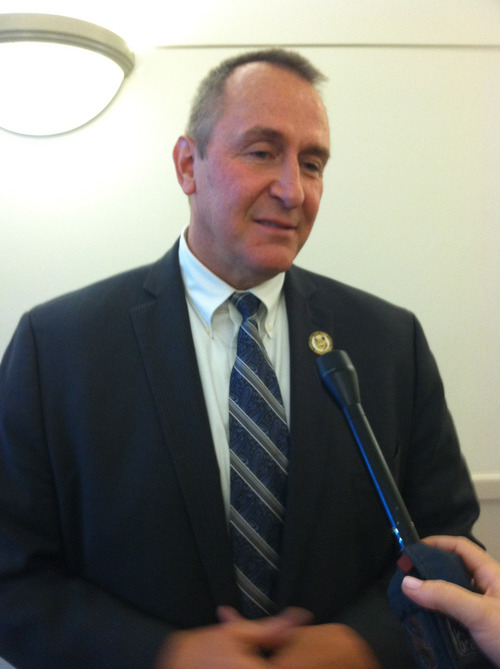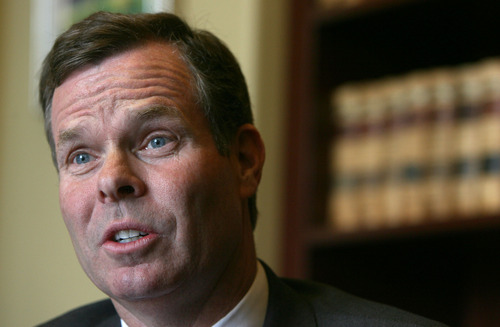This is an archived article that was published on sltrib.com in 2013, and information in the article may be outdated. It is provided only for personal research purposes and may not be reprinted.
Three Utah businessmen say John Swallow suggested they would have protection in the Attorney General's Office if they were willing to contribute to Mark Shurtleff's campaign fund.
The three men independently tell strikingly similar stories. In separate 2009 meetings, Swallow indicated that donors would get special consideration if the Attorney General's Office ever had to pursue complaints against their businesses.
"Essentially, what we were told was: 'Look, at the end of the day, we want to know who you guys are, because if someone gives us a complaint or calls us from another agency. … We want to be able to head it off at that level,' " one of the businessmen recalls Swallow saying.
All three were in the direct marketing and Internet sales industry and spoke on condition of anonymity, fearing reprisals against their businesses and friends by Swallow, who succeeded Shurtleff as attorney general, if they spoke publicly.
Two of the three have been interviewed by the FBI, which is investigating Swallow.
All told, the three men, their companies and partners gave about $50,000 to Shurtleff's campaign in 2009, when Swallow was Shurtleff's lead fundraiser, before Swallow became Shurtleff's chief deputy attorney general.
"We now had a friend at the highest level of Utah law enforcement," one donor said.
Utah law prohibits soliciting campaign funds with the promise of any official action.
Swallow's campaign adviser dismissed the allegations as unworthy of response.
"The campaign is not going to speculate on these absurd accusations by anonymous sources," Jason Powers said in an email Tuesday night. "However, I've been eyewitness to hundreds of fundraising meetings and phone calls by Mark Shurtleff and John Swallow. I've never heard either of them say anything like that. In fact, I've heard them stress the opposite, that a donation does not get you any special treatment."
The revelations could pose serious new problems for Swallow, who is already under fire for his relationship with Jeremy Johnson — who offered a variety of other Internet-based services — and helping Johnson's I Works when it was under investigation by the Federal Trade Commission.
Johnson said he agreed to pay $600,000 to a Swallow friend and former employer, Richard Rawle, the owner of the Provo-based Check City payday-loan chain, who planned to use the money to persuade Senate Majority Leader Harry Reid to intervene in the FTC investigation of I Works. Johnson, at times, has said the payment was meant to be a bribe — a charge both Reid and Swallow deny.
—
No special treatment • None of the three ever received special treatment from the attorney general's office, the businessmen said. Two of the men said Shurtleff attended the meetings in which Swallow offered special treatment by his boss.
Shurtleff denied Swallow made such an offer in any meetings he attended. If he had, Shurtleff said, he would have put a stop to it. He said in an interview that no donor was ever given preferential treatment during his 12 years in office.
"I can go to my grave and face my God knowing that I never gave anyone special treatment or did anything inappropriate," Shurtleff said. "I was so cautious, any time I ever talked to one of these guys and every time I got a campaign contribution, I said, 'You understand this has nothing to do with the job?' "
David Irvine, an attorney and former legislator who works with the group Utahns for Ethical Government, said if the stories the businessmen are telling are true, the law was absolutely broken.
"That's straight-up pay to play," Irvine said, "and I don't see any way that a prosecutor could consider that to be a legal, legitimate transaction or discussion."
Another lawyer also said the allegations raised serious questions.
"Just from a smell test, it's something that a prosecutor is going to have to look long and hard at," said Brett Parkinson, a former federal prosecutor in Utah who now practices in California. But, he said, corroborating the stories could be difficult.
In one meeting, Swallow reportedly told donors on hand that they were in a "high-risk" industry, and that customers who have second thoughts can demand refunds and make complaints to regulators if they aren't satisfied.
"We understand this business, and we have these things come across our desk all the time," one of the men recalls Swallow saying during his pitch.
"If it's somebody we're not familiar with, we're just going to treat it normally and prosecute it like we normally would," the business owner said, describing Swallow's comments. "But if you donate to the campaign, you're going to lunch with Shurtleff. He's going to know you. He's going to know what you're doing. And when we get complaints coming across our desk, we'll take that into consideration."
—
An investment • In one of the meetings, a donor said, Swallow couched the pitch for money as a long-term investment, saying he planned to run for attorney general after Shurtleff stepped down. Shurtleff, who reportedly was at the meeting, said he was pushing Swallow as his replacement.
"[Swallow] would always phrase it: 'In case anything ever happens, I can watch for your name,'" the donor said.
The overtures were not unique — the businessmen said they spoke with others in the industry who told of receiving similar offers.
The direct marketing and Internet sales industry was fertile turf for Shurtleff's fundraising, as such businesses poured hundreds of thousands into Shurtleff's campaigns through the years, and many of the companies that were his biggest donors have since been the target of actions by federal regulators.
Johnson, his family, I Works and his associates contributed more than $200,000 to Shurtleff's campaign before the FTC froze the St. George businessman's assets in late 2010. Johnson also supported charities in which Shurtleff was involved. Photos show Shurtleff and Johnson headed to a fundraiser on Johnson's jet and Shurtleff behind the wheel of Johnson's Lamborghini.
Questions have been raised before about whether those big donors were offered protection from the attorney general.
In 2009, state Sen. Steve Urquhart, R-St. George, took his concerns to the U.S. attorney and met with federal agents to discuss his suspicion that Shurtleff was protecting big donors.
Last year, two former telemarketing business owners, Aaron Christner and Ryan Jensen, said that it was well-known that donations to Shurtleff could help fend off action by regulators, although they never contributed money.
Shurtleff has strongly denied both allegations.
The attorney general's office frequently met with donors who were under investigation by the Utah Division of Consumer Protection, according to Francine Giani, the executive director of the Department of Commerce who often locked horns with Shurtleff. The meetings, which took place without the knowledge of the investigators, were a frustration.
"I would hope the people who represent us in the attorney general's office would not be meeting with any individuals who are targets of our investigation," she said. "I think that would be unethical. I think it would go against the attorney-client [relationship]."
Tom Harvey contributed to this report.





